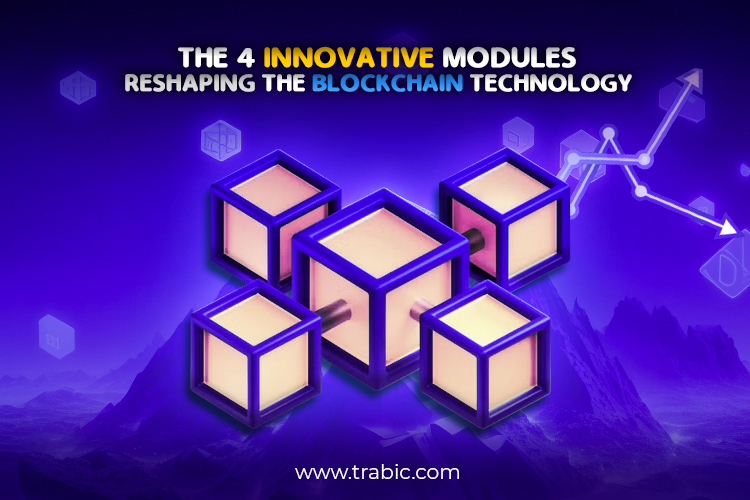Blockchain technology has come a long way since its inception with Bitcoin. Over the years, it has evolved into a versatile and transformative force, largely thanks to innovative modules that have reshaped the landscape. In this article, we’ll delve into the rapid evolution of blockchain, exploring how these innovative modules are revolutionizing the space.
Blockchain technology has undoubtedly brought a revolution in our general concept of data security, transparency, and trust in digital transactions. While blockchain was initially introduced through cryptocurrencies like Bitcoin, its applications have expanded beyond digital currencies. In recent years, we have witnessed the emergence of innovative blockchain modules that are reshaping the entire landscape of blockchain technology.
One of the critical modules driving this transformation is the concept of Smart Contracts. Smart Contracts are self-performing contracts with predefined rules and conditions. These contracts instinctively execute when specific conditions are met, removing the need for intermediaries and enhancing the efficiency of various industries. Smart Contracts have found applications in fields ranging from supply chain management to insurance, automating processes and reducing the risk of human error.
Another groundbreaking module is Decentralized Finance (DeFi). DeFi platforms leverage blockchain technology to provide decentralized financial services, including lending, borrowing, and trading, without the need for traditional intermediaries like banks. DeFi has gained immense popularity for its potential to democratize finance, providing access to financial services to anyone with an internet connection.
Interoperability is a crucial module addressing the issue of blockchain fragmentation. Blockchains often operate in isolation, but interoperability solutions like blockchain bridges and protocols aim to connect these networks. This enables seamless data and asset transfers between disparate blockchains, fostering collaboration and expanding the potential use cases of blockchain technology.
Scalability has been a persistent challenge in blockchain, and Layer 2 solutions offer a promising solution. These modules build on top of existing blockchains to enhance their scalability and speed. For example, the Lightning Network for Bitcoin and Ethereum’s Layer 2 solutions, like Optimism, aim to process transactions faster and at lower costs, making blockchain technology more practical for everyday use.
Privacy remains a concern in the blockchain space, and modules like Zero-Knowledge Proofs (ZKPs) provide enhanced privacy features. ZKPs allow users to prove ownership or knowledge of specific information without revealing the underlying data. This technology is crucial for industries that require privacy, such as healthcare and finance.
Tokenization is another innovative module that transforms real-world assets into digital tokens on a blockchain. This enables fractional ownership of assets like real estate, art, and intellectual property. Tokenization modules make previously illiquid assets more accessible for investors and create new opportunities for asset management.
Oracle networks play a vital role in connecting blockchain applications with real-world data. These modules bridge intelligent contracts and external data sources, ensuring that blockchain applications can access accurate and up-to-date information essential for industries like supply chain management and prediction markets.
Proof of Stake (PoS) is an energy-saving consensus module gaining traction as an alternative to the resource-intensive Proof of Work (PoW) used by Bitcoin. PoS modules, like Ethereum’s transition to Ethereum 2.0, allow network participants to validate transactions and secure the blockchain based on the number of coins they hold, reducing the environmental impact of blockchain technology.
Cross-chain communication is a module that enables different blockchains to communicate and share data. This is particularly valuable for developing multi-chain ecosystems and creating decentralized applications (DApps) that operate across multiple blockchains.
Finally, Non-Fungible Tokens (NFTs) have disrupted the art, entertainment, and gaming industries. NFTs are unique digital assets representing ownership of digital or physical items and are often used for digital art, collectibles, and in-game items. NFTs have initiated new avenues for creators to monetize their work monetization and for collectors to prove ownership of unique digital assets.
Understanding the Rapid Evolution of Blockchain Technology
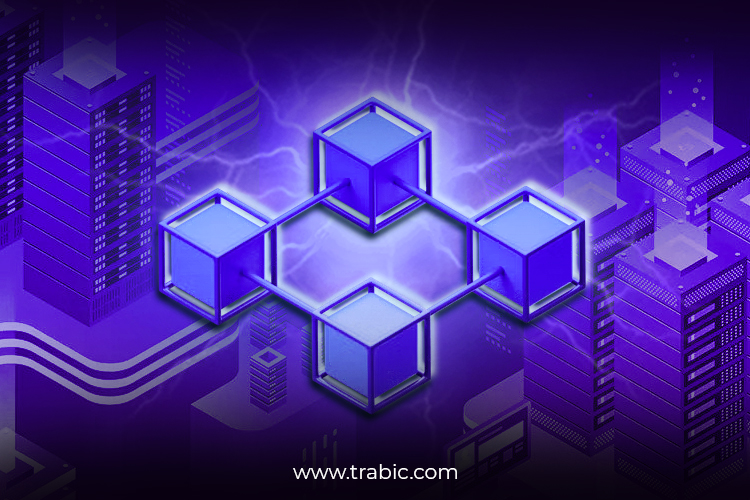
Understanding the rapid evolution of blockchain is crucial to grasping how innovative modules are reshaping this transformative technology. Conceived initially as Bitcoin’s underlying infrastructure, blockchain has evolved into a versatile and far-reaching technology. This evolution has been driven mainly by incorporating innovative modules and specialized components that enhance and extend blockchain’s capabilities. These modules serve as the building blocks that enable developers to customize and tailor blockchain networks to meet the demands of specific use cases.
At the core of this evolution is the reinvention of intelligent contracts. Initially popularized by Ethereum, smart contracts have evolved from simple, self-executing agreements to sophisticated tools capable of executing complex business logic autonomously. This transformation has broadened the scope of blockchain applications, enabling it to move beyond simple transactions and currency transfers to encompass a wide array of decentralized applications and processes.
Innovative modules play a pivotal role in enhancing the security and functionality of blockchain networks. They empower developers to address scalability, interoperability, and privacy issues, which have historically posed challenges to the extensive adoption of blockchain technology. As a result, blockchain has transitioned from being a niche technology primarily associated with cryptocurrencies to a robust and adaptable crypto platform with implications for many industries, from finance and supply chain supervision to healthcare and voting systems.
The rapid evolution of blockchain is intricately tied to the integration of innovative modules. These modules drive the technology’s adaptability and versatility, opening up new horizons for its application in various domains. By understanding the role of these modules, we gain insights into how blockchain continuously evolves to meet the ever-developing demands of the digital age, making it a force to be reckoned with in the world of technology and finance.
The Role of Innovative Modules
Innovative modules are the building blocks of blockchain’s evolution. They are specialized components that enhance blockchain networks’ functionality, security, and versatility. These modules can be integrated into existing blockchains, enabling developers to tailor their networks to specific use cases.
Smart Contracts Reinvented
One of the most significant innovations in the blockchain space has been the reinventions of intelligent contracts. This self-executing, initially popularized by Ethereum, contracts have evolved to become even more innovative and more efficient. They now support complex business logic and automated decision-making processes.
DeFi and the Smart Contract Revolution
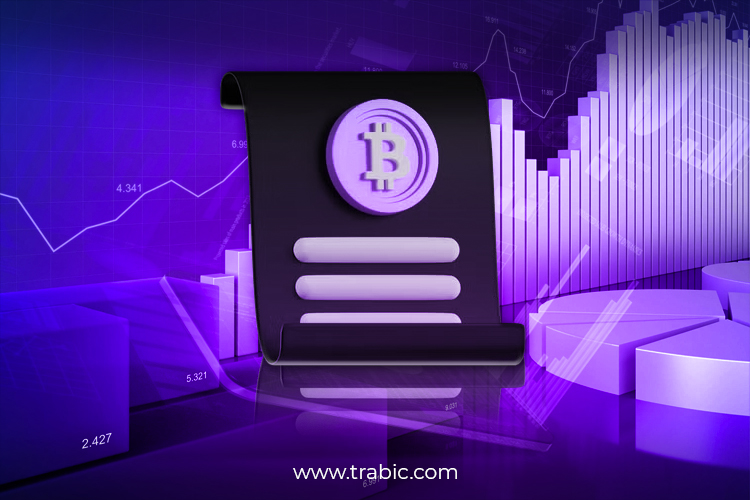
DeFi, or decentralized finance, represents a significant paradigm shift within the blockchain ecosystem, and it plays a central role in the ongoing evolution of smart contracts. DeFi applications have gained immense popularity due to their potential to disrupt traditional financial services. In this context, innovative modules within the blockchain landscape have emerged as crucial components facilitating the DeFi and intelligent contract revolution.
At the heart of DeFi’s success lies the concept of smart contracts. These self-executing contracts, which Ethereum pioneered, have evolved considerably. Initially capable of executing simple transactions, they have matured into powerful tools capable of automating complex business logic and decision-making processes. Innovative modules have played a pivotal role in enhancing the capabilities of smart contracts, enabling them to facilitate a wide range of financial services, from lending and borrowing to decentralized exchanges and yield farming.
One of the critical challenges in DeFi is the need for real-world data integration. This is where oracles, a fundamental module, come into play. Oracles provide external data feeds to intelligent contracts, permitting them to make enlightened decisions based on real-world events, such as stock prices, weather conditions, or sports scores. Integrating oracles has allowed DeFi applications to expand beyond the blockchain’s inherent limitations, creating a bridge between the digital and physical worlds.
Scalability has been another significant concern in the blockchain space, and DeFi applications are no exception. Innovative modules have introduced Layer 2 scaling solutions like the Lightning Network to address this issue, enabling faster and more cost-effective transactions by processing them off the main blockchain. These solutions are essential for DeFi platforms, where high transaction volumes and low latency are critical for the seamless operation of financial services.
DeFi and the smart contract revolution have transformed the blockchain landscape, and innovative modules are the driving force behind this transformation. They have empowered intelligent contracts to become more sophisticated and versatile, enabling the creation of decentralized financial ecosystems that challenge traditional finance. With the integration of oracles and scalable solutions, DeFi is expanding its capabilities and improving its accessibility and efficiency, paving the way for a more inclusive and decentralized financial future.
Oracles and Real-world Data Integration
Decentralized finance (DeFi) has gained immense popularity and innovative modules have played a pivotal role in its success. Oracles, for instance, facilitate the integration of real-world data into smart contracts, enabling applications such as decentralized lending, insurance, and prediction markets to thrive.
In decentralized finance (DeFi) and the broader blockchain ecosystem, integrating real-world data has become a pivotal factor in expanding the utility and relevance of smart contracts. A fundamental challenge lies at the heart of this transformation: How can blockchain networks, designed to operate trustless and self-contained, access and interact with real-world data and events outside the blockchain environment? The answer to this challenge is found in the role of oracles.
Oracles, in the context of blockchain technology, are trusted data sources that provide external information to smart contracts. These sources can range from centralized entities that retrieve data from the internet to decentralized networks that aggregate and validate information from multiple sources. Oracles bridge the gap between blockchain’s deterministic, closed nature and the inherently uncertain and variable real world.
One of the critical insights into the importance of oracles is that they enable intelligent contracts to execute based on real-world events. For example, in decentralized insurance, a smart contract can automatically trigger a payout to a policyholder if it receives verifiable data from an oracle confirming that a natural disaster, such as an earthquake, has occurred in a specific region. This level of automation and trust minimizes the need for intermediaries, reducing costs and increasing the efficiency of financial processes.
DeFi, in particular, has greatly benefited from the integration of oracles. These platforms offer financial services, including loaning, borrowing, and trading, without the requirement for traditional intermediaries like banks. DeFi applications require accurate and up-to-date data on asset prices, interest rates, and market conditions to function effectively. Oracles are critical in providing this data, allowing DeFi protocols to make informed decisions and execute transactions automatically.
However, the reliance on oracles also introduces challenges, primarily related to data accuracy and security. As intelligent contracts execute based on the data provided by oracles, the accuracy and reliability of this data become paramount. Manipulating or compromising an oracle can lead to significant financial losses and system vulnerabilities. Thus, selecting trustworthy Oracle providers and implementing robust security measures are essential for DeFi projects.
Scalability Solutions
Blockchain’s scalability challenges have long been a roadblock to mainstream adoption. However, innovative modules have introduced scalable solutions. Layer 2 scaling solutions, including the Lightning Network, offer faster and more cost-effective transactions by processing them off the main blockchain. This not only enhances performance but also reduces congestion and lowers transaction fees.
Layer 2 Scaling: Lightning Network and Beyond
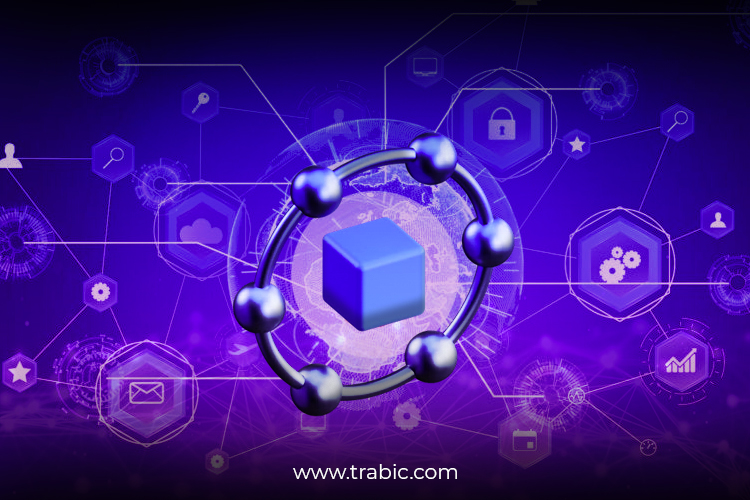
Layer 2 scaling solutions, including the Lightning Network and other innovations, are pivotal in reshaping the blockchain landscape. These solutions address one of the most significant blockchain technology challenges: scalability. Blockchain networks like Bitcoin and Ethereum have faced limitations in conditions of transaction productivity, leading to overcrowding and high transaction fees during periods of high demand.
The Lightning Network, in particular, has emerged as a groundbreaking module that significantly enhances the scalability of blockchain networks. It operates as an off-chain solution, allowing users to create payment channels to process transactions instantly and with minimal fees. These transactions are conducted off the main blockchain, reducing the burden on the primary network and alleviating congestion issues. As a result, the Lightning Network has the potential to transform blockchain into a viable option for daily transactions, competing with traditional payment systems in terms of speed and cost-effectiveness.
Beyond the Lightning Network, other Layer 2 scaling solutions are also contributing to the evolution of blockchain technology. Sharding, for instance, involves splitting the blockchain into smaller segments, or shards, each of which can process transactions independently. This modular approach significantly increases the network’s throughput, enabling it to handle a more extensive volume of transactions simultaneously. Sharding holds excellent promise for blockchain scalability, offering a path to support mainstream adoption and widespread use.
Moreover, privacy-preserving technologies are integral to Layer 2 scaling and scalability solutions. By implementing privacy modules, blockchain networks can ensure that sensitive data remains confidential, even on public blockchains. Zero-knowledge proofs, for instance, enable users to prove the authenticity of a transaction without revealing the transaction details. This enhanced privacy and security are essential for fostering trust and expanding blockchain’s utility beyond cryptocurrencies.
Layer 2 scaling solutions are revolutionizing the blockchain landscape by addressing scalability issues, reducing transaction fees, and improving overall network performance. Innovations like the Lightning Network, sharding, and privacy-preserving technologies are driving the evolution of blockchain technology, making it more accessible and adaptable to a wide range of use cases. As these modules continue to advance, they hold the potential to propel blockchain technology into mainstream adoption and reshape industries across various sectors.
Sharding: Breaking Down Blockchain Bottlenecks
Sharding is another breakthrough in blockchain scalability. It involves splitting the blockchain into smaller, manageable segments called shards. Each shard can process transactions independently, significantly increasing the network’s throughput. This modular approach reduces bottlenecks and enhances overall performance.
Privacy-Preserving Technologies
Blockchain’s inherent transparency can be a double-edged sword, making privacy a concern. Innovative privacy-preserving technologies enable users to transact privately on public blockchains, including zero-knowledge proofs and confidential transactions. This enhances security and expands the potential use cases of blockchain technology.
Zero-Knowledge Proofs: A New Era of Privacy
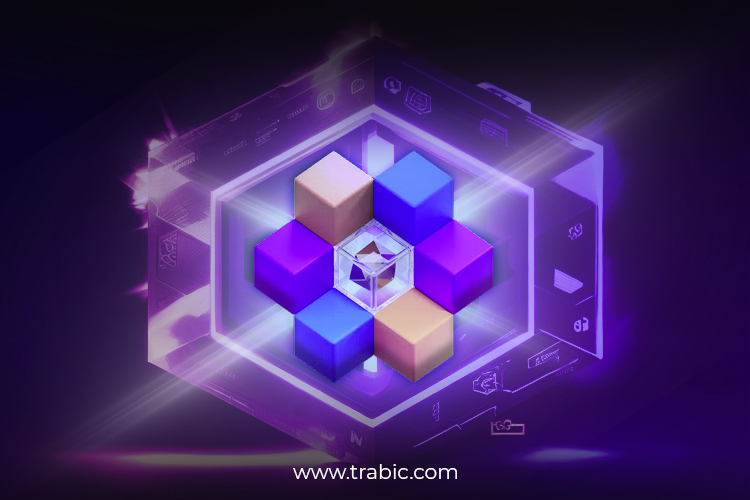
Zero-knowledge proofs (ZKPs) are cryptographic techniques that permit one party to prove to another party that they possess certain information without disclosing it. This is a groundbreaking development because it enables transactions and data verification on a blockchain while maintaining high privacy and confidentiality. ZKPs have gained widespread recognition for their potential to address the inherent transparency of blockchain networks, which can sometimes expose sensitive information.
One critical insight is the application of ZKPs in blockchain technology, which has the potential to transform how transactions and interactions occur on the blockchain. By using ZKPs, individuals and entities can engage in transactions with a high level of privacy, as the transaction details, such as the sender, receiver, and transaction amount, remain hidden from view. This is particularly valuable in applications where privacy is paramount, such as financial transactions and confidential business agreements.
Moreover, ZKPs enable the creation of privacy-focused cryptocurrencies like Monero and Zcash, often called privacy coins. These cryptocurrencies utilize zero-knowledge proofs to obscure transaction details, making them virtually untraceable and providing users with enhanced financial privacy. This development has garnered attention from users who prioritize anonymity and security in their blockchain transactions.
Furthermore, the section emphasizes that zero-knowledge proofs are not limited to financial transactions; they have many applications. These applications span industries like healthcare, supply chain management, and voting systems, where sensitive data must be shared and verified without exposing the underlying information. By introducing ZKPs into these domains, blockchain technology can provide a secure and private way to handle critical data.
Zero-knowledge proofs are crucial to the broader discussion about innovative modules reshaping the blockchain landscape. It showcases the potential of zero-knowledge proofs to usher in a new eon of privacy and security in blockchain technology. It makes it more versatile and applicable across various sectors while addressing data confidentiality and transparency concerns.
Confidential Transactions and Privacy Coins
Confidential transactions hide transaction amounts, ensuring that financial details remain confidential. Privacy coins like Monero and Zcash leverage these innovative modules to enhance users’ anonymity. This is crucial for those who prioritize privacy in their blockchain transactions.
Zero-Knowledge Proofs: A New Era of Privacy
Zero-knowledge proofs are cryptographic techniques that allow one party to prove to another party that they know a specific piece of information without revealing the information itself. This powerful concept is at the heart of many privacy-focused blockchain applications, ensuring that sensitive data remains secure and confidential.
Conclusion
The blockchain landscape is in a constant state of evolution thanks to these innovative modules. As we embrace the future of blockchain technology, it’s essential to recognize these advancements’ role in shaping a more efficient, scalable, and private blockchain ecosystem. The ongoing evolution of blockchain promises to unlock new possibilities and reshape industries across the globe.
Individuals and organizations must embrace innovative modules and explore their potential applications to stay at the forefront of this quickly evolving technology. As blockchain continues to evolve, these modules will unquestionably play a vital role in shaping its future and driving innovation in various sectors.
In summary, blockchain is not just a technology; it’s a dynamic ecosystem driven by constant innovation. By harnessing the power of innovative modules, we can look forward to a blockchain landscape that is more capable, secure, and adaptable than ever before.
